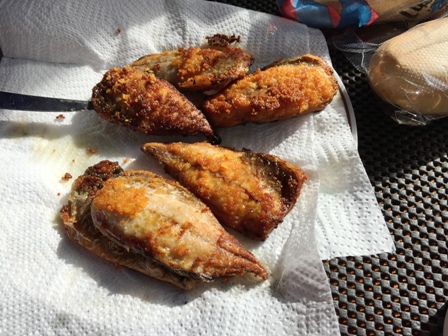The Wild Atlantic Way ~ Day 6
 “It won’t get any fresher than that.”
“It won’t get any fresher than that.”
Skipper Brian serves up a plate of pan-fried mackerel, which, only 15 minutes prior, was swimming deep below the surface of Donegal Bay. We are aboard his fishing vessel, 3 kilometers from shore. As the waves rise and fall, I wedge two fillets into a locally baked baguette.
“Here,” he continues with a thick Killybegs drawl, “try a little sauce on that.” Sure enough, the fish is delicious. “That’s how we’ve been doing it here for years; me, my father before me, and his father before him.”
While Eire’s fishing industry has softened in recent years, with moratoriums in effect on several stocks, mackerel have been steady game for generations.
“We make do with what we’ve been given,” says Skipper Brian. “That’s just the way it is, the way it’s always been here.”
That Irish resolve and resourcefulness is also evident at the Burren Smokehouse, four hours south in Lisdoonvarna.
“We smoke the salmon right here on site,” says Birgitta Curtin, who along with her wise-cracking husband Peter own and operate both the facility and the Roadside Tavern next door.
The couple set up shop in 1989, inspired by their surroundings.
“Ireland has never really been industrialized,’ she explains. “Because of that, the landscape is as it has been for hundreds of years, and the water and soil are still relatively pure.”
As members of EcoTourism Ireland, Good Food Ireland, and other local and national community organizations, the Curtins understand the importance of preserving the island’s natural habitat. “A clean environment makes for better tasting and more wholesome, nutritious options right across the entire food spectrum,” notes Curtin.
Jessica Murphy agrees.
“We only source the freshest local produce,” shares the co-owner of the Kai Café in Galway. “And the west coast of Ireland is abundant with fresh produce.”
With an array of unique meat, fish, cheese and vegetable dishes on the menu, Murphy and her husband David are pioneers of the Emerald Isle’s Slow Food movement.
“It’s kind of a philosophic throwback to older times, when the planning, preparation and eating of a meal was an all-day event to be shared by family, friends and acquaintances. It’s a healthier process, and you can really taste the difference.”
Ireland’s Slow Food movement has gained serious momentum in recent years, with local chapters putting on more events each season to promote the region’s burgeoning food sector. All up and down the country’s west coast, eateries of all shapes and sizes are now combining contemporary cuisine with classic cookery, creating a unique culinary culture.
At the luxurious Lough Eske Castle Hotel in Donegal, Chef Philipp holds court in the kitchen.
“The entire food industry has changed here over the last twenty years,” he says. “A large part of that is because customers are now much more aware and picky about what they will put into their bodies.
“As a result we have had to re-examine what and how we prepare and serve food. It is no longer merely about eating, it is about creating an experience.”
That experience includes education, engagement, entertainment and more.
“Food tours have become extremely popular,” says Andrew Pelham-Burn of award-winning Carrowholly Cheese near Westport in County Mayo. “Whether it is a walking tour through Galway, a bus excursion, or a personalized car hire, people want to be involved at all levels of the process.
“And the Wild Atlantic Way is really quite ideal for that,” he adds. “There are lots of opportunities for some exceptional food adventures here. Some of them can be quite rugged too – you will certainly earn your meal.”
Back in Donegal Bay, Skipper Brian is pan-frying up a second round of mackerel.
“I prefer them done well,” he shares out loud, a spatula in one hand, and a cold beer in the other. “That’s how we’ve been doing it here for years; me, my father before me, and his father before him.”
You have to be out here, he says – on the water – to get the full flavor of the fish, the real meal.
“And let me tell you, laddie, it won’t get any fresher than that.”
~ Stephen Patrick Clare



















Leave a Comment